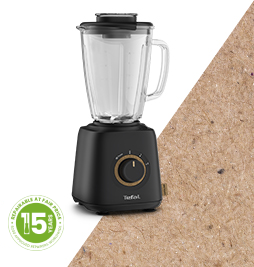Our products are there to support you every day and make your life easier,
but the fact is that they consume resources and energy.
When we produce them and when you use them.
Discover our eco-design approach and how we can act together.

It is about offering you products with a reduced environmental impact, without compromising
in terms of performance or the services they provide for you every day.

100% recycled
aluminium body

15 years
repairability

35%
energy saving*

90%
recyclable**
* One slot vs both slots, at the same browning level. Internal test. 2020
**Potential recyclability, to be sorted in the appropriate facilities
It all starts with a better understanding of the environmental impact of our
products, from the extraction of the resources needed to manufacture them,
right to their end of life. To do this, we have carried out Life Cycle Analysis (LCA)
on the majority of our product families.
This is a standardised methodology, which allows us to quantify and understand environmental impacts
throughout the product life cycle* :

*based on greenhouse gas emissions report, Groupe SEB 2016

For Tefal products, the greatest environmental impact comes from the usage
phase and the extraction of raw materials.
Discover how to reduce your environmental impact when using
our products with eco-tips.
The life cycle analysis of our products allowed us to identify
5 eco-design priorities to reduce our impacts:
Our ECOdesign label allows you to quickly spot our top eco-designed products.

The labelling we have put in place is based on a rigorous methodology, setting
precise thresholds for each of the 5 criteria above, as well as strict rules on
label governance. Audited by Ernst & Young, in compliance with ISO 14020
and 14021 standards.
Discover more about our criteria in the different product categories

It is products with a lower environmental impact that are there to assist you on a daily basis and make your life easier.
Discover our different eco-designed ranges.
Reducing the overall environmental footprint of our products is a shared approach:
it is us, when we design, produce and transport them. And it is also you, when you use them.
Here are some eco-tips you can implement every day.

Slice It ! Chop your food into smaller pieces for faster cooking, reducing the time and energy consumed

Steam powerHang your clothes in the bathroom when you take a shower. The steam will relax the fibres of the fabrics and they’ll naturally smooth out when you put on your clothes.

Keep it fresh To avoid food waste, store fruits and vegetables in boxes: they'll stay fresh for up to twice as long.

Non-essential oilsDon’t use essential oils! They can damage the internal components of your iron and cause breakage or premature wear.

Laundry care Hang your clothes carefully when drying for easy ironing. Spending a few more seconds spreading your clothes out will save you precious minutes when ironing. Shorter ironing sessions = time and energy saved.

Just what you need Heat only the amount of water needed, this will consume less energy and the hot water will be ready much faster.

Let's recycle Did you know that stainless steel and aluminium are infinitely recyclable? You can recycle your kitchen utensils to give them a second life in the appropriate sorting centres.

Save your timeRECOMMENDATIONS
Your iron heats up quickly : so begin by ironing fabrics that are ironed at low temperatures first, then go on to those requiring a higher temperature. So you will save your time

No time to waste Cook your beans in a pressure cooker it’s 2X faster and saves up to 50% more energy compared to a traditional saucepan!

Stay Smooth Use a non-abrasive sponge and mild detergent when washing your pans to avoid premature wear.

Keep it clean Descale your kettle regularly, ideally once a month and more often if you live in a hard water area. Use 8% commercial white vinegar. Fill the kettle with 1/2 l of vinegar, leave the cold solution to soak for 1 hr. Empty your kettle and rinse it 5 or 6 times. Repeat if necessary.

Washing Dish To save water when washing, soak your pans before cleaning.

Energy saving Use a lid to keep the heat in for faster cooking and boiling, and therefore less energy consumption.

Laundry careNever use water containing additives (starch, scents, softeners, etc.), or water produced by condensation (e.g. water from tumble-driers, refrigerators, air conditioners, rain water). The types of water contain organic waste or mineral elements that can cause spitting, brown staining, or premature wear of the appliance.

1,2,3 Cook ! For perfect searing, use the Thermo-Signal® indicator: it indicates when the frying pan is sufficiently preheated, then you can reduce the heat and avoid wasting energy.

Pamper your steam ironIf your water is very hard, it is possible to mix tap water with storebought distilled or demineralised water in the following proportions :
- 50% tap water,
- 50% distilled or demineralised water
The self-cleaning function helps to slow down scaling in your iron. In order to extend the life of your iron, use the Self-Cleaning function and clean the anti-scale valve (once a month).

Don't mess with wires To help your appliances last longer, avoid wrapping the cord around the device after use, as the tension could damage it prematurely.

Second lifeAppliance no longer working? Instead of discretely throwing it in the bin or leaving it at the back of a cupboard, have it repaired or take it to the nearest recycling centre!

View the product warranty conditions

Find a repairer


